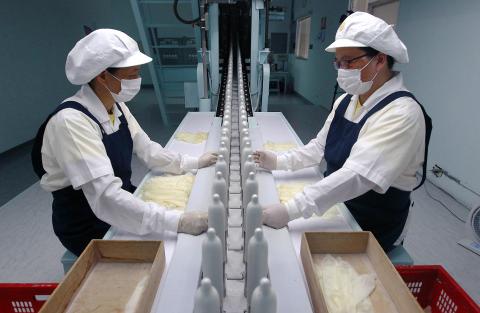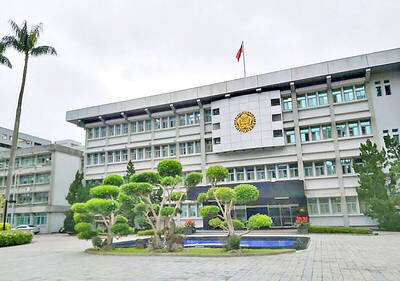An unusual tourist attraction is getting ready for its official opening next month and while its main theme is enticing for some, it is likely to turn some faces red.
It is the nation’s very own “Condom Tourism Factory,” in New Taipei City’s (新北市) Tamsui District (淡水).
Visitors will be able to get to know the history of prophylactic devices, watch how condoms are produced, learn about the latest safe sex tips and view various special exhibitions. There is also an interactive “do-it-yourself” station for trying on a condom and other simulations.

Photo: Pichi Chuang, Reuters
Located at a Taiwan Fuji Latex Co plant, the nation’s only condom manufacturer, the concept is a collaboration with the New Taipei City Government.
Founded in 1973, the company brought to Taiwan the technology of Fuji Latex Co of Japan. The factory was built in Tamsui, then in Taipei County, to produce condoms for the domestic market.
The company introduced the latest electronic pinhole examination equipment from Japan and reached a 100 percent inspection accuracy rate. A company official said prior to 1973, the majority of condoms in Taiwan derived from US aid programs, but the US condoms were unsatisfactory as the products’ dimensions were unsuitable for Asian men.
After mass production began in 1973, a Swedish aid foundation signed a contract with Taiwan Fuji Latex Co to supply condoms to India and Africa in a program organized with the WHO and the International Red Cross.
That fell through later that year when Taiwan lost its seat at the UN along with its membership of the WHO and a host of other UN agencies. As a result, the company’s Japanese partner pulled out of Taiwan.
Yu Chi-cheng (游啟政), chairman of Taiwan Fuji Latex Co, said the company developed its own brands afterwards and subsequently got export orders from other countries.
“We had export orders for the UK, France, Canada, the US and Russia, from more than 40 countries. Our record was 34.56 million condoms produced in one month, that was enough to supply Taiwan’s needs for a whole year,” Yu said.
The government’s population policy in the 1980s was “Two kids are just right,” so the company’s production followed the policy, supplying condoms to clinics, hospitals and medical centers throughout the nation starting in 1981. At that time, the company began marketing its products and condoms began to appear on the shelves of convenient stores, supermarkets and pharmacies.
“Currently, we have 65 percent of the market in Taiwan. There are more than 50 different brands of condoms and they are all made by our company,” Yu said.
However, for many years Yu has been highly critical of the government’s handling of the sector.
“Until now, the government has not paid much attention nor given any support to Taiwan’s small and medium-sized enterprises. In fact, they are rather unfriendly to these companies,” he said.
Yu lamented that as years go by, Taiwan’s society and its population makeup have changed.
“Condoms were used as a means of population control in the old days, now they are for disease prevention, but factory operating costs keep getting higher, while new laws are putting more stringent limitations on the firm,” Yu said.
Two years ago, Yu was prepared to relocate the factory to either China or Vietnam. At that time, the New Taipei City’s Economic Development Department (EDD) came to him to discuss the possibility of transforming his condom factory into a “tourism factory.”
“In the past year, government officials have been seriously pursuing this plan, with follow-up talks and providing support. I felt their enthusiasm and sincerity to get this plan off the ground,” Yu said. “Therefore, I decided to keep my roots here in Taiwan.”
According to the EDD, the Condom Tourism Factory has four different sections — “knowledge about condoms,” “the production process,” “the little love shop” and a souvenir store.
There are guided tours and displays to explain the history of and how to use condoms properly, with a tour of the production facilities and the testing laboratory.
The Condom Tourism Factory is scheduled to open on Aug. 22.

The German city of Hamburg on Oct. 14 named a bridge “Kaohsiung-Brucke” after the Taiwanese city of Kaohsiung. The footbridge, formerly known as F566, is to the east of the Speicherstadt, the world’s largest warehouse district, and connects the Dar-es-Salaam-Platz to the Brooktorpromenade near the Port of Hamburg on the Elbe River. Timo Fischer, a Free Democratic Party member of the Hamburg-Mitte District Assembly, in May last year proposed the name change with support from members of the Social Democratic Party and the Christian Democratic Union. Kaohsiung and Hamburg in 1999 inked a sister city agreement, but despite more than a quarter-century of

The Ministry of Foreign Affairs (MOFA) yesterday expressed “grave concerns” after Singaporean Prime Minister Lawrence Wong (黃循財) reiterated the city-state’s opposition to “Taiwanese independence” during a meeting with Chinese Premier Li Qiang (李強). In Singapore on Saturday, Wong and Li discussed cross-strait developments, the Singaporean Ministry of Foreign Affairs said in a statement. “Prime Minister Wong reiterated that Singapore has a clear and consistent ‘one China’ policy and is opposed to Taiwan independence,” it said. MOFA responded that it is an objective fact and a common understanding shared by many that the Republic of China (ROC) is an independent, sovereign nation, with world-leading

The Ministry of Justice Investigation Bureau (MJIB) has been investigating nine shell companies working with Prince Holding Group, and the Taipei District Prosecutors’ Office is seeking further prosecution of alleged criminals, a source said yesterday. The nine companies and three Taiwanese nationals were named by the US Department of the Treasury’s Office of Foreign Assets Control (OFAC) on Oct. 14 as Specially Designated Nationals as a result of a US federal court indictment. Prince Holding founder Chen Zhi (陳志) has been charged with fraud, conspiracy, money laundering and overseeing Prince Holding’s suspected forced-labor camps in Cambodia, the indictment says. Intelligence shared between Taiwan,

COOLING OFF: Temperatures are expected to fall to lows of about 20°C on Sunday and possibly 18°C to 19°C next week, following a wave of northeasterly winds on Friday The Central Weather Administration (CWA) on Sunday forecast more rain and cooler temperatures for northern Taiwan this week, with the mercury dropping to lows of 18°C, as another wave of northeasterly winds sweeps across the country. The current northeasterly winds would continue to affect Taiwan through today, with precipitation peaking today, bringing increased rainfall to windward areas, CWA forecaster Liu Pei-teng (劉沛滕) said. The weather system would weaken slightly tomorrow before another, stronger wave arrives on Friday, lasting into next week, Liu said. From yesterday to today, northern Taiwan can expect cool, wet weather, with lows of 22°C to 23°C in most areas,